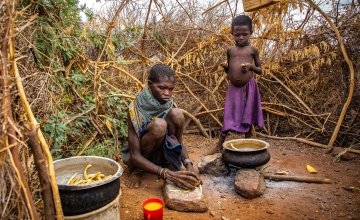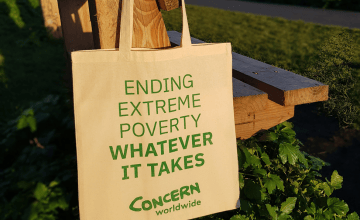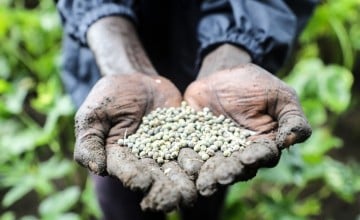
Read our 2023 annual report

Knowledge Hub
If you think you’re powerless against climate change and that one person can’t make a difference, we urge you to think again.
The United Nations defines climate change as, “a change of climate which is attributed directly or indirectly to human activity that alters the composition of the global atmosphere”.
While the scale of the challenge is daunting, small changes can make a huge difference and we’re urging everyone to take responsibility for their individual contribution. Through our work with some of the world’s poorest communities, we’ve seen that the climate crisis is having a devastating impact on people’s livelihoods and claiming the lives of the most vulnerable.
One region that has already been destroyed by the climate crisis is Turkana in Northern Kenya.
Everything has dried up

An area the size of Ireland, Turkana used to experience drought every 15 to 20 years.
However, from the late 1990s onwards, that reduced to every five years and, more and more, the devastating effects of global warming are resulting in lost lives.
“We used to drink milk, we used to eat meat and we had a lot of harvest from the forest. Life was so good,” pastoralist Atiir Kataboi told us.
“But now, things have really changed since the drought came in… it has cleared all the animals, all the livestock, the fruits of the land. The trees have also withered, there is nothing that comes from them. Everything has dried up.”
So, what can you do to help?
1) Stop using disposable cups
Did you know that, globally, more than 500 billion disposable cups are discarded to landfill or incineration every year? Let’s break that down: that’s one million cups a minute, every hour of every day of every year. The Conscious Cup campaign describes how these cups are virtually impossible to recycle due to the combination of paper and plastic in their design.
In Ireland alone, we dispose over 22,000 of these cups every single hour.
While there are recyclable and compostable cups on the market in Ireland, these should not be placed in the recycle bin. Mixed recyclables get sorted by machines that cannot differentiate between different types of single use cups, so plastic can end up in the paper stream and cause contamination.
Thankfully, we’re in something of a reusable cup revolution. Many cafés are now rewarding those people who bring their own cup with discounts, while others charge extra if you choose an environmentally-unfriendly single use container.
Get yourself a reusable cup and you can save money, as well as the planet.
2) Consider the environment when voting
Ireland goes to the polls on 8 February 2020 and Concern believes that climate action and overseas development aid should be priorities for the incoming government. That why we’re backing the One Future campaign, an initiative that is calling for faster and fairer climate action.
Our next government could be in place for as long as five years and these five crucial years will go a long way towards reducing emissions and hitting those 17 sustainable development goals set out by the Paris Agreement in 2015.
One key thing that you can do to help fight the climate crisis is to talk to political candidates about the issue when they come to your doorstep. The One Future website offers suggested talking points and materials to give candidates at the door, as well as advice on joining a canvass and spreading the word through social media.
You can follow the movement here.
3) Make single-use plastic a thing of the past
Soft plastic cannot be recycled, and plastic bags risk escaping into the environment via landfill sites. More than eight million tonnes of plastic end up in the ocean every year, according to the United Nations, as our addiction to single-use plastic continues.
Around the globe, one million plastic drinking bottles are purchased every single minute, while up to five trillion single-use plastic bags are used worldwide every year. This is clearly not sustainable.
Ireland has top quality drinking water, for the most part, and reusable bottles are as commonplace now as reusable cups. Some of them even keep your drinks cold - a very worthwhile investment.

The Irish levy on plastic bags was a massive success and more and more, we’re remembering to bring our tote bags or trusty bags for life when going to do the local shop. However, we’re still relying on smaller plastic bags to bring home our fruit and vegetables. We grab those clear, single use bags without thinking so why not bring along some extra, smaller cotton or mesh bags and do your bit for the universe?
4) Use energy wisely
As environmentalist David Suzuki says, “In a world of seven billion people, each of us is a drop in the bucket. But with enough drops, we can fill any bucket”.
This is one way to articulate how the actions of every single person make a difference to the future of the planet, and small energy savings can quickly add up to both protect the environment and save you money.
These include:
- Changing to energy-efficient light bulbs
- Installing heat pumps in the home
- Unplugging computers, televisions, laptops and other electronic devices when not in use
- Washing clothes at lower temperatures
- Hang-drying clothes
A full list of Suzuki’s recommendations can be found here.
5) Eat less meat
Did you know that deforestation to make way for livestock, along with the methane emissions that come from cows and the use of fertilizer, creates the same amount of greenhouse gas as all of the world’s cars, trucks and airplanes?
In October 2018, scientists warned that a massive reduction in meat eating is essential to avoid the breakdown of the earth’s climate.
Beef consumption in western countries, in particular, needs to fall by as much as 90% but our reliance on pork, milk and eggs must also drop sharply as the Earth’s population is expected to swell by two billion over the next 30 years.

A lot more people are switching to a plant-based diet by either cutting down on their meat consumption or going cold turkey entirely, so to speak. There are plenty of easy and tasty recipes online and fast food chains are increasingly offering meat-free alternatives so you don’t even have to miss out on your Friday treat!
6. Go Green
One of the most fun ways to do your bit to support those being impacted by climate change is to join the many people around the country who will be donning green on 13 March.
Your support will supply farmers with drought resistant seeds, help introduce farmers to climate-smart techniques such as Conservation Agriculture and provide a family with fortified flour that is enriched with the nutrients they need to keep going during hunger gaps.
Climate change is one of the key drivers for the recent rise in global hunger.
We’re working with communities to withstand the damage already being caused by climate change and help build resilience for the future.
A global problem
The climate emergency extends far beyond Africa. This is a global crisis and waiting to take action is no longer an option.
According to the UN, one billion people across 100 different countries are threatened by desertification – the process by which fertile land turns to desert – and that figure is only going to get bigger as the planet heats up.
Extreme weather has already affected a staggering 62 million people since 2018, droughts and floods have almost doubled since the early 1990s, the world’s poorest countries are those most at risk, and more than 100 million people face intense poverty inside a decade if we don’t each take responsibility.
While the most important action we can take to safeguard the future of our planet is to use our voice (and our votes) to apply pressure to those with the power to reach zero emissions by 2050, we must also fight our own complacency and make any necessary changes in our daily lives.
Get involved
On Friday 13 March, we’re asking the people of Ireland to Go Green for Concern and help families on the front line of the climate crisis.
By going Green for Concern, you can support us to reach more people on the front line of the climate crisis. A greener world has never been so important.





